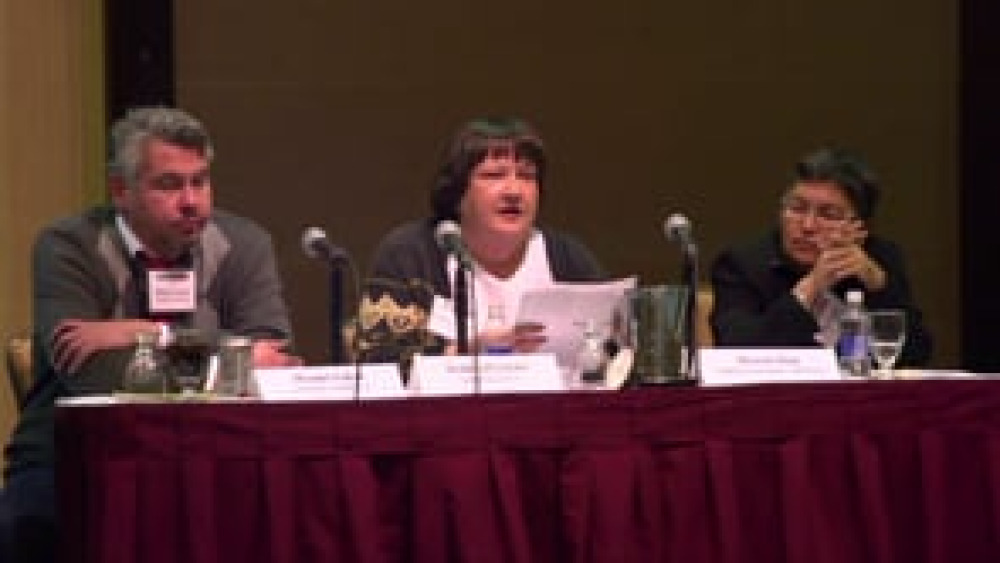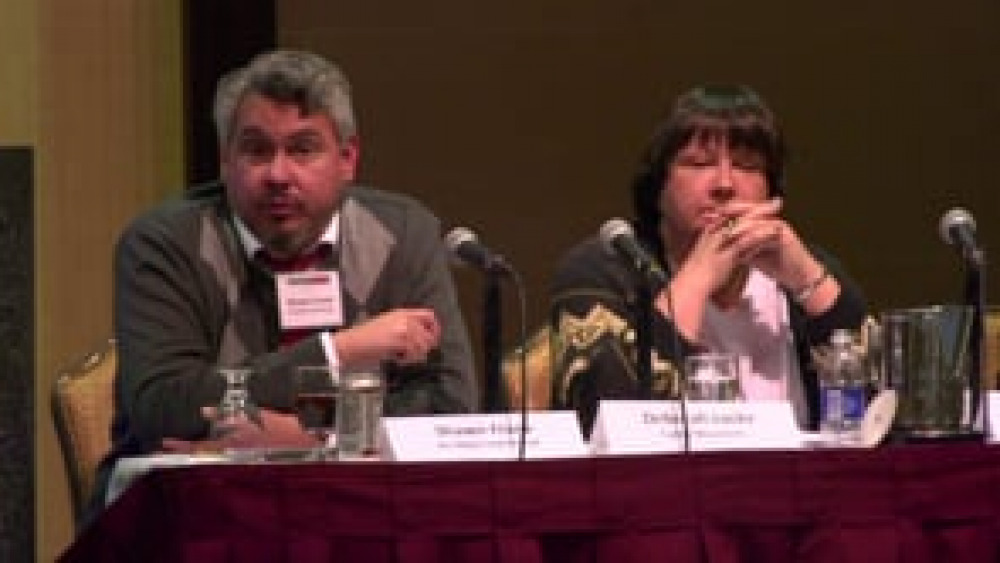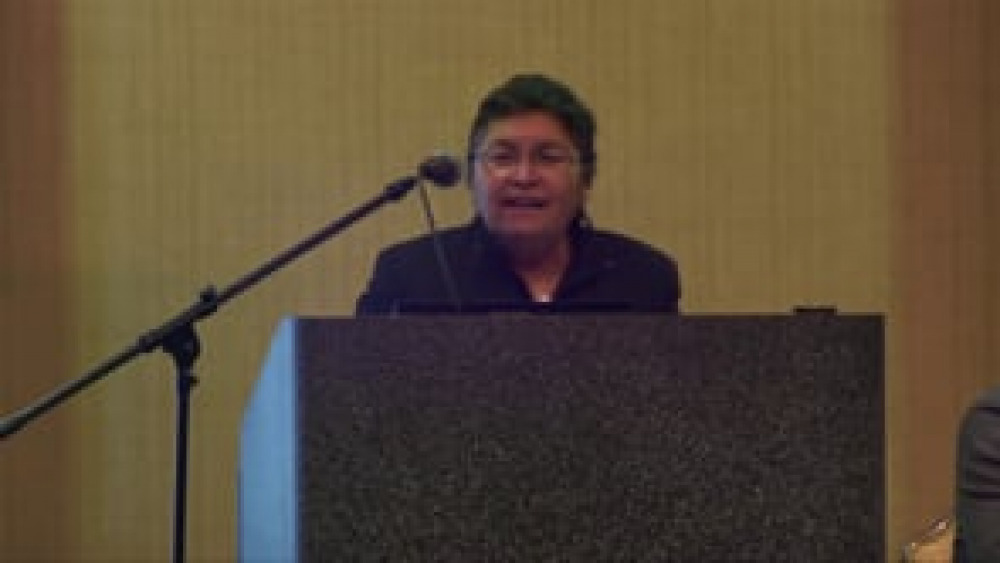Panelists Sharon Day, Shawn Frank, and Deborah Locke field questions from the audience and a few participants offer their closing thoughts on the question of tribal citizenship and identity.
This video resource is featured on the Indigenous Governance Database with the permission of the Bush Foundation.
Additional Information
Day, Sharon. "Disenrollment (Q&A)." Tribal Citizenship Conference, Indian Law Program, William Mitchell College of Law, in conjunction with the Bush Foundation. St. Paul, Minnesota. November 13, 2013. Presentation.
Frank, Shawn. "Disenrollment (Q&A)." Tribal Citizenship Conference, Indian Law Program, William Mitchell College of Law, in conjunction with the Bush Foundation. St. Paul, Minnesota. November 13, 2013. Presentation.
Locke, Deborah. "Disenrollment (Q&A)." Tribal Citizenship Conference, Indian Law Program, William Mitchell College of Law, in conjunction with the Bush Foundation. St. Paul, Minnesota. November 13, 2013. Presentation.
Transcript
Matthew Fletcher:
"My wife, Wenona Singel, wrote a paper where I think I've learned more from this paper than anything else I've read and she...two points about the paper I think that are important. The first is...the paper's called "Indian Tribes and Human Rights Accountability" and it seems to me that there is a -- seems to her and I agree -- that there's a gap in human rights coverage and the gap applies to Indian tribes. International law obligates nations to guarantee minimal human rights and there are things in the United Nations Declaration [on the Rights of Indigenous Peoples], for example, that include these kind of principles, but they don't apply to sub-nations like Indian tribes and so tribes ostensibly have no outside accountability for some of the things they do. That's one of the reasons we have the lack of federal court jurisdiction over things like tribal membership issues is an issue. The other thing is the question of sovereignty and Indian tribes assert sovereignty over tribal membership decisions and if you think about sovereignty, the same kind of arguments that tribes are asserting now when they're defending themselves from challenges on questions of disenrollment are exactly the same things that the southern states made when they were challenged over slavery prior to the Civil War. And if you read the Dred Scott case, there's a long rambling dissertation in there about sovereignty, how internal governance matters should be left to the states alone and outsiders shouldn't have anything to say over that. So I just wondered if you wanted to... if that inspired any commentary from anybody."
Shawn Frank:
"I just think in terms of the sovereignty issue -- maybe I shouldn't answer this since it's framed versus an exercise tantamount to endorsing slavery -- but I think the tribes do have that authority and they can take actions pursuant to that authority. I think the question becomes of whether or not they should, but I certainly...one of the things I do believe is that tribes have to exercise their sovereignty in certain regards because what good is being a sovereign nation with independent authority in certain instances if you're not willing to exercise it? And I think that in issues of membership, that's an important exercise of a tribe's sovereign authority. And I think kind of getting back a little bit to kind of one of the themes of Sharon's [Day] presentation was I think Indian nations are in an interesting position because you have these traditional notions -- not notions, that makes it sound quaint -- these traditions of clans and kinship and where things were really fluid and loose, but as tribes became more like western governments and they adopted constitutions and laws, the tribes now are required to follow those constitutions and laws and sometimes they don't allow this sort of traditional healing, community togetherness concept because there are specific criteria in the specific things that tribes have adopted. So it's kind of a desire sometimes to get back to more kinship and inclusive thing, but the tribes by their own adoption of some constitutions and some other ordinances have really prevented that from being able to happen."
Sharon Day:
"But sovereignty also means that they could do that as well, they could move in the direction that I was referring to if they so choose. That's sovereignty, that's exercising sovereignty."
Audience member:
"After hearing everything that was presented today, I often wonder what the 570-some tribes throughout the United States that are going through enrollment issues, that if there could ever be a conference or a reunification of Indigenous tribes here, not just the continental United States, but the South American, Canadian come together and look at what has...so that there'd [be] a standardization hopefully maybe within the tribes, so that we'd send a message say to the federal government, to the Department of the Interior that we all have the same standards, that's what we're going to abide by. I think we're all going through the decolonization as Sharon was saying and we're still gun shy in what we do. Why? Because we're only one tribe amongst nations of many others and to set a precedence, not just for our tribe, but other tribes here have different things. For instance, they were talking about citizenship and that presentation. Well, if you don't reside on a reservation you don't get any of the benefits. And there again the question was, well, you get benefits, but you have pride in being a tribal member. And often we all say that what's good enough for one tribal member is good for all whether it be the benefiter or etc.
And so I think as a short-term goal probably within say even a year is try to get the message out to all the tribes in the United States, come together somewhere say centrally located, Oklahoma, Nebraska, whatever, come together and have a large summit. That would be a dream and if we go with the clan systems or a way of life, which our people followed many years ago that...whatever, it'd work out to be the best because...me and Willard went to Las Vegas for an enrollment issue and listened to that and we hear different perspectives on enrollment; you hear good stories, you hear sad stories, you hear pondering stories. You're like, 'Okay, I've got my head scratching, I'm thinking,' but you have to know your people also. Ms. [Deborah] Locke was talking about what happened to her and that could very easily fit a lot of tribes throughout the United States and nobody likes to open up Pandora's box to what legalities would come out of that. But the big thing is I'd love to see a summit because if we make these changes today, we're going to leave a legacy for our children and I still think that our children will still be looking at this issue down the line going into the 22nd century. [Anishinaabe language]."
Sarah Deer:
"Any other questions or comments for the panel? I guess we have a lot to think about. Well, let's thank our panel for speaking...for joining us today."
Audience member:
"Well, actually before we clap I guess, we're hoping to get a copy of your article because we'd like to..."
Sharon Day:
"I'll send it to Colette [Routel] and she can send it."
Audience member:
"...Because we'd like to include that into our newsletter and I think...I really enjoyed your presentation..."
Sharon Day:
"Thank you."
Audience member:
"...As a member of the lodge, it's good to have our grandmothers stand up and remind us of the different things that we have. And it's...one of the things I've always enjoyed about when I worked at White Earth is that even though it's a different place there's the common teachings that exist and it's good to know that, John Borrows talked about when you identify your clan you have that connection, so for us in the lodge is that understanding because one of the things that they teach us is the unconditional love, it's to be able to accept them as they are and respect all ways. I guess I do have a comment.
So one of the things I hope that...I hope for not just as a tribal attorney, but as a tribal member is that there is an effort to try to educate our tribal members to understand...someone presented about tribal civics and we talked about this in some of the council meetings, we've talked about this on the reservation about having an opportunity to teach ourselves what our government is like, because there's such a distrust that's come from this federal model and that people who are afraid of trusting authority automatically attack our tribal model and that undermines us because it's...but for the fact that we have these treaties that exist because there's no such thing as an individual sovereign, there's the idea of tribal sovereignty. People will attack our governments because they don't like to be told 'no,' but they don't know what to do to try to get to 'yes.'
I think sitting at this table...I try to remind our council...because I studied this when I was a kid growing up. My dad was someone who was very vocal and involved in this type of work and then when I went to college and I went to the Marine Corps, I went to law school, you keep the sense of identity of who you are and it attaches to your tribe, but more for me it was attaching to who my family was. I'm a junior so I carry myself in the way that knowing that my actions reflect on my dad, but they also reflect on my family and that's a teaching that we have in our lodge and that. So for me citizenship is kind of really difficult for me to understand because I'm always going to be a member of my family and [Anishinaabe language], means 'all my relations.'
And so when one of our family members walks on in our lodge, and I know this is taught in other lodges, someone else needs to stand up and do their work because that work needs to get done. And so that's what I envision and that's what I've seen growing up on the reservation, me and Willard. We've kind of been joking with him the whole day about trying to get him to speak, but I grew up with Willard and as we get older we take more of these responsibilities and among the people that I grew up with we say, 'It's our time. It's our time to do this work now. It's our time to look to our elders like Gordon and Rusty and the ones who've opened up this path for us. It's time for us to pick up that...' Well, they probably don't want to drop it right now, but they're ready for us to start doing this work and helping them carry it that much farther so that our children have an idea of where they come from. But we have to start...I think we need to do more to trust the governments that we have and trusting them by understanding what their role is, understanding where the root of the idea of sovereignty comes from, understanding what the role of the government is supposed to be so that just because you get a negative decision, and I don't mean that in reflection of anything that's been said today, but you understand the purpose of what it is. You have to protect the identity and the protection that we have as a collective group because for every negative instance we have there's a positive instance of a negative action from a government. And I say that as a lawyer.
But people...some tribes sell their memberships and they sell it to people who can pay whoever is on council to do that or they sell the right to go hunt and fish and those are things that are not intended as those treaties were done. My dad used to...my dad told me, 'One of the major things about the treaties was Article 5 of the '37 Treaty.' He said, ''42 was the best one negotiated for the Ojibwe's, but Article 5 is the one that encompassed us the right to hunt, fish and gather as the way we understood that because hunting, fishing and gathering was the instrument and the means for us to get the deer, the wild rice, the fish and the plants and the medicines for us to have our ceremonies. And for us to have our ceremonies allowed us to go from birth to passing with all the ceremonies that go on in between there and that allowed us to keep our connection between our ancestors and we have something to give to our grandchildren. And that maintains our identity as Ojibwe and as Anishinaabe.' And so when I get an opportunity to teach in the schools I talk about that, but I try to put a face on that.
Gordon was the chairman for our tribe when we had the void litigation that opened up this idea of reaffirming our rights in the 7th Circuit and also in the Western District of Wisconsin. Rusty has been a 20-year veteran in the Army. And so we need to do more to recognize the contribution of our individual members and when they sit on council it's not just 'f*in' council did this' or 'f*in' council did that.' What it means is that we have people who have made a sacrifice of their personal selves to put themselves in a leadership position to take the responsibility of what happens and then respect them for their contribution instead of saying, 'Well, their family did this or their family did that.'
When I took the job as the tribal attorney, I stood in front of the council and said, 'I will let go of my responsibilities as my family and not carry the grudges going forward and I will serve my council to the best of my ability to carry that forward,' and I've tried my best to do that. You've got pressures that come all the time, but I think if we're going to really have a serious conversation about what citizenship is, whether it's the political discourse or membership, whether it's belonging to that group, you have to have an idea of what is your responsibility to contribute and not just expect something in return, not just to say, 'Well, I get to go hunting and fishing because that's my treaty right.' That treaty right came at the sacrifice of thousands of people who had to sneak in the woods at night because there was people who were trying to take that away from them. I read the BIA [Bureau of Indian Affairs] reports, I've seen the game warden reports from like 1910 when they confiscated the fish and the deer from this old elderly couple from Lac du Flambeau and the father...the male died in custody and they made the mother walk home from the lake that she was at. You would never even think about doing that now. You would never, ever contemplate doing that, but that's a sacrifice that they did so that...we need to remember those stories and they did that because...they did that to survive, but I bet you their children knew how to hunt, fish and gather and they knew how to speak their language and they understood those seven principles that come from your teaching in the lodge and they understand what the seven fires are.
And I hope that if there's some day that we have that conversation so there is a thread that connects us so that we never forget the sacrifice of who we are and what's been done to give us that chance. And I hope that we are able to make that same sacrifice so that our grandchildren can look back and say, 'Well, there was this fat guy at a conference one time who said...kept jabbering on, everybody wanted to go home...' but at least we keep that connection alive. So that's what I would say. And I say [Anishinaabe language] for your teaching."
Sharon Day:
"[Anishinaabe language]."
Sarah Deer:
"Thank you."



